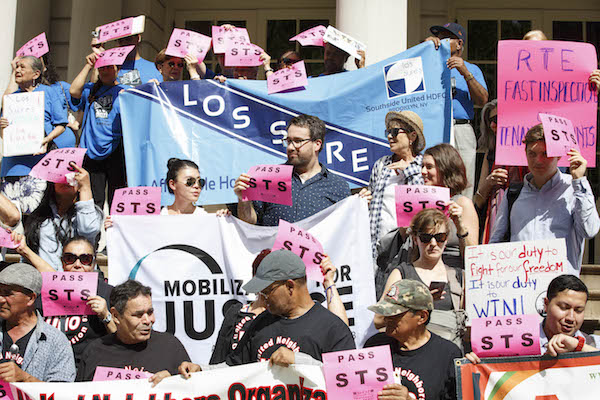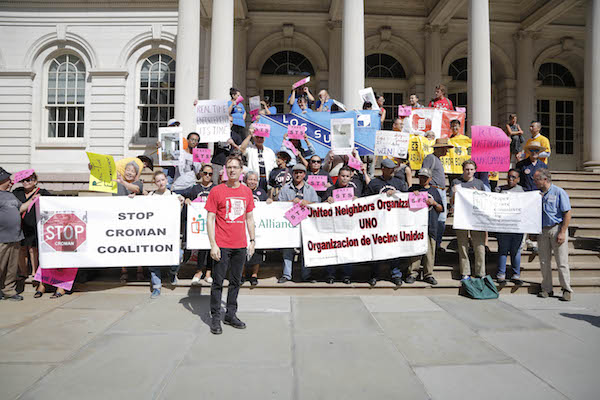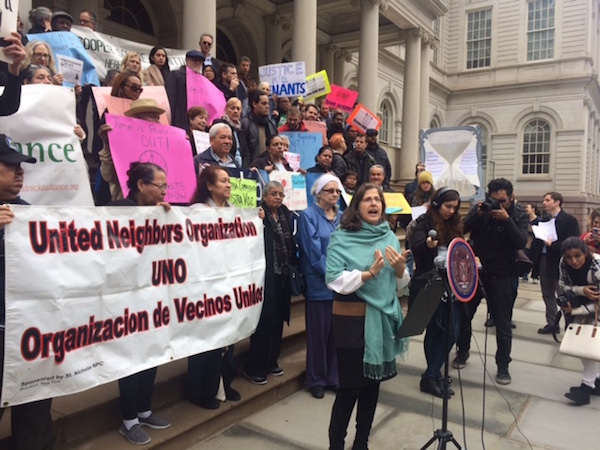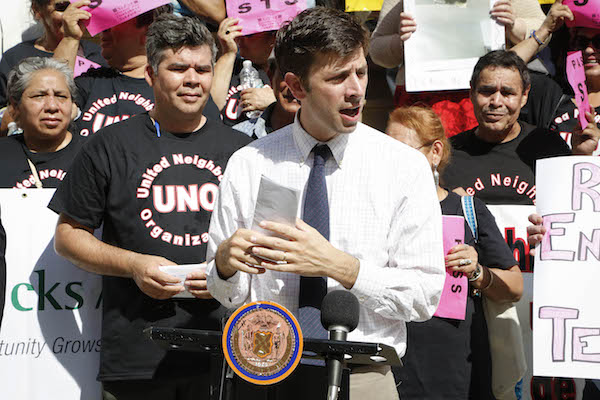
BY EILEEN STUKANE | Tenants subjected to dangerous and intentionally demoralizing conditions were given new hope last week, in the form of legislation designed to, among other things, mitigate “construction as harassment” — a tactic employed by landlords and building owners in which unpleasant living conditions are used to harass rent-regulated New Yorkers until they move out, with the aim of renting or selling their units at today’s high market rate prices.
The last of the 12 Stand For Tenant Safety (STS) Coalition’s bills was passed by the New York City Council on Wed. Sept. 27 — a hard-won victory that makes serious advancements in the quest for detecting landlord abuses, enforcing existing policies, and protecting tenants.
Sponsored by Brooklyn Councilmember Stephen Levin, this last bill will create a Real Time Enforcement Unit (RTEU) within the Department of Buildings (DOB) — which, as one of its mandates, will follow up with inspections within a short period of time after receiving complaints about work being done without a permit. The RTEU will not be the only new division to be created within the DOB.
Just a month earlier, on Wed. Aug. 30, Mayor Bill de Blasio signed into law, 18 pieces of tenant safety legislation that included 11 out of the 12 STS-generated bills. Among the remaining seven bills signed by the Mayor was one sponsored by Upper West Side Councilmember Helen Rosenthal, which created a new Office of Tenant Advocate, a watchdog division for tenants within the DOB. The DOB has historically been a monitor of building practices — codes, zoning, permits, and construction safety issues among them.
Growing tenant complaints about construction as harassment and falsified permits have required the DOB to look beyond its usual agendas, but the issues have not abated. These new bills should bring a greater shift toward prioritizing tenant issues at the agency, but lawmaking is only a start.
ENDING DEVIOUS LANDLORD MANEUVERS: THE NEXT STEP: STS (standfortenantsafety.com) is a coalition of almost 30 organizations. Nine Councilmembers sponsored the STS 12-bill package, with some sponsoring more than one bill. It has been a four-year march toward the accomplishment of this legislation. Brandon Kielbasa, director of organizing at Cooper Square Committee (coopersquare.org), one of the coalition members, is also a voice for the STS when he speaks about the continued commitment to follow up on the implementation of the new laws, which for the most part are amending laws that were already on the books.
“We’re not at all viewing this as the end of the road but as reaching a milestone in the campaign. The campaign will change focus now,” Kielbasa told this publication, adding, “We’re going to go crazy spreading the word in the next year. We’ll create materials, do tenant information sessions, just spread the word like mad.”
STS will surely have help from the City Councilmembers who sponsored bills because they are especially aware of the suffering of their constituents. They have been pounded by tenant associations and community organizations, with individual stories of impossible living conditions that include the cutting off cooking gas, toxic dust and fumes, collapsed ceilings and walls, broken windows, the invasion of vermin, relentless jackhammering, all conducted by landlords who want to pressure them to leave their homes so they — the landlords — can convert their apartments to market value.
“The reality is that these problems are really plaguing the entire city for the most part,” Kielbasa said. “There are a few neighborhoods that don’t have these issues but anyplace that has rent regulation is starting to see them.” He explained that core neighborhoods with overheated housing markets are seeing construction as harassment in higher volume. Neighborhoods that are rezoned, and faced with development following the rezoning, are targets for unscrupulous landlords and bad acting developers.

The Tenant Harassment Prevention Task Force, which was established in 2015 as a collection of state and city agencies headed by the New York State Attorney General’s Office, investigates and brings actions, including criminal charges, against landlords who harass tenants. Recently it found Icon Realty Management guilty of multiple violations, hazardous conditions among them, and ordered Icon to pay $500,000 in fees and fines. However, this task force cannot do it all. “As much as we’re really glad to have the Attorney General and the Tenant Protection Unit going after landlords,” Kielbasa noted, “They’re looking at specific ones and saying ‘We’re going to take this one on because this is a clear case.’ That is really welcome enforcement. The reality is that they can’t take on all of them because there are just so many bad acting landlords who employ this stuff in these hot neighborhoods.”
Enter the RTEU and the Office of Tenant Advocate. Within the DOB the staffing of the two new divisions, the RTEU and the Office of Tenant Advocate, is unknown as yet. The Office of Tenant Advocate is due to take effect on Dec. 28, 2017 (each law goes into effect at a specified date). As Councilmember Rosenthal explains, “We’re in the rule-making period where the Department of Buildings is deciding how to implement and identify this office.” Rosenthal is committed to working with the Mayor’s Office to make the Office of Tenant Advocate an effective one. “It’s important to me that it be implemented in the way we envisioned it,” she said. The DOB was not in favor at first.
When hearings were held on these bills in April, representatives of the DOB were quoted as saying that a Tenant Advocate would “create no improvement” and that the work of the Tenant Advocate is already handled elsewhere in the DOB. Now that the Office of Tenant Advocate has been legislated, Andrew Rudansky, DOB’s deputy press secretary emailed this statement: “We are currently reviewing the legislation and its implementation. Tenants who believe they are being harassed by their landlord should report it to 311 immediately, and we will send an inspector to investigate. DOB is a proud partner in the city’s Tenant Protection Task Force, through which we’ve conducted over 2000 harassment-related safety inspections over the last year alone, resulting in hundreds of violations to building owners. We look forward to continuing our work with our fellow agencies to crack down on owners who unnecessarily endanger the lives of their tenants through illegal construction-based tenant harassment.”

Rosenthal is energized to help model the Office of Tenant Advocate similarly to the Mayor’s Office of Special Enforcement, which has the ability to shut down locations in which illegal activities are taking place and bring unsafe conditions into compliance. Her hope is that the Tenant Advocate could be accessed via 311, and also online through a DOB dropdown menu — a link on the DOB website that creates a level of priority for tenants looking for help. “My feeling is that as we start to navigate the system for our tenants, we need to define safety more broadly,” said Rosenthal. The DOB’s concern has mostly been focused on construction safety. “Safety is not just for residents walking under a sidewalk shed,” she noted. “It’s also for residents who live right next door where a building owner is trying to harass them out.”
The two new DOB divisions, the RTEU and the Office of Tenant Advocate, along with the strengthened laws — which include: creating a multi-agency task force to monitor construction work in multiple dwellings, instituting liens against landlords who ignore fines, cracking down on work done without a permit, and preventing falsified permit claims that a building is unoccupied — are designed to change the culture of construction. Their effectiveness will be tested.

A COMMENT FROM THE COMMUNITY: Representing the Chelsea-based Community & Residents Protection Group (CRP), which has been monitoring falsified building permits in the area, Pamela Wolff called these new laws “essential steps” to protect residents and combat “citywide abuse construction activity.”
Enforcement, however, remains a concern. “Existing laws require the applicant to sign a construction permit, to acknowledge if the building will be occupied during construction and to acknowledge if any of the units are subject to rent regulation,” Wolff noted, “If it will be occupied there must be a Tenant Protection Plan submitted before a permit can be issued that addresses basic safety issues such as fire safety, lead and asbestos dust.”
Further citing existing laws that provide for DOB enforcement actions (including fines ranging from $4,800 to $24,000 and the revocation of permits), Wolff added that the CRP’s recent survey of just five Chelsea blocks found eight buildings which “falsely certify the buildings are not occupied. Seven falsely certify the buildings are not occupied by rent regulated residents. Fifteen do not have the Tenant Protection Plans included, even though six of those have certified the buildings are occupied. Laws are useless if they are not enforced. Enforcement is the critical element.”
The reality is that the DOB will need greater manpower to undertake enforcement. Now that it has successfully ushered its 12 bills into law, the STS Coalition intends to make this reality a priority for city officials. “We’ll be advocating for them,” Kielbasa vowed. “We’ll be fighting during budget season. The DOB needs more staff, needs to maintain actual boots on the ground.”
With enough resources to enforce tenant safety laws, the drive to end construction as harassment — and other abuses that chip away at the city’s affordable housing stock — will enter a new phase.



































